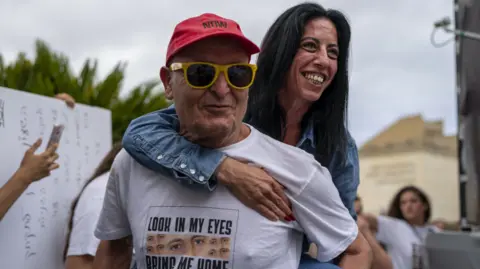
 Getty Images
Getty ImagesWorld leaders have welcomed the news that Israel and Hamas have agreed to the first phase of a Gaza peace plan.
The deal paves the way for the release of Israeli hostages and Palestinian prisoners, the withdrawal of Israeli troops from Gaza and the entry of aid into Gaza.
Israeli Prime Minister Benjamin Netanyahu called the agreement "a great day for Israel" and said his government would convene on Thursday to approve it.
Hamas said the negotiations were "responsible and serious" and called on the US and other mediators to ensure that Israel implements the deal "without disavowal or delay".
UN Secretary General António Guterres described the agreement as a "momentous opportunity", adding that the UN will support the "full implementation" of the deal, increase its delivery of humanitarian aid and advance its reconstruction efforts in Gaza.
Guterres urged all parties to obey the terms of the deal, including releasing Israeli hostages, abiding by a permanent ceasefire, and immediately allowing humanitarian supplies into Gaza.
"The suffering must end," he said.
Tom Fletcher, UN under-secretary general of humanitarian affairs, wrote on X: "Great news. Let's get the hostages out and surge aid in - fast."
In a Truth Social post announcing the agreement, US President Donald Trump said it was a "GREAT Day for the Arab and Muslim World, Israel, all surrounding Nations, and the United States of America".
He added: "We thank the mediators from Qatar, Egypt, and Turkey, who worked with us to make this Historic and Unprecedented Event happen."
UK Prime Minister Sir Keir Starmer said the deal was a moment of "profound relief that will be felt around the world".
He called on all sides "to meet the commitments they have made, to end the war, and to build the foundations for a just and lasting end to the conflict".
Australian Prime Minister Anthony Albanese said: "After more than two years of conflict, hostages held and a devastating loss of civilian life, this is a much needed step towards peace," and "We urge all parties to respect the terms of the plan."
US House Leader Chuck Schumer said the agreement brings a "huge sigh of relief to the hostage families, to all of Israel, and to Palestinians who have suffered for so long in this horrific humanitarian catastrophe".
The Hostages Families Forum, an organisation that has advocated for the return of Israeli captives in Gaza, expressed "profound gratitude to President Trump" for what it called an "historic breakthrough".
Israeli Defence Minister Israel Katz said the release of the hostages was a "blessing" and thanked US and Israeli leaders.
"I warmly embrace the families of the hostages for the anticipated return of their loved ones, including IDF soldiers and fallen heroes, home soon."
Meanwhile in Gaza, residents of Khan Younis, in the territory's south, erupted in cheers following the announcement of a peace deal, Reuters reported.
"Thank God, today President Trump announced that the war stopped, we are very happy that the war stopped, this is something joyful for us and we thank our brothers and anyone who contributed even if verbally to stop the war and to stop the bloodshed," Wael Radwan told the news agency.
"Thank God for the ceasefire, the end of bloodshed and killing. I am not the only one happy, all of the Gaza Strip is happy, all the Arab people, all of the world is happy with the ceasefire and the end of bloodshed," said Abdul Majeed Rabbo.
"I hope the coming days bring us happy news and that we and our loved ones live in safety," Mousa, a doctor in Deir al-Balah in central Gaza, told the BBC over WhatsApp on Thursday morning.
"We have lost a lot during the two years of war. The Gaza Strip is destroyed. A difficult time still awaits us, but the important thing is we hope to be safe."
In the south, pharmacist Suha Shaath said she was in disbelief.
"Until now, I don't believe that this war could be ending and that I and still alive – we have survived this catastrophe," she said.
Israel does not allow international journalists independent access to Gaza, so much of the BBC's communication with people there over the past two years has been over messages and phone calls.
In Tel Aviv, the mother and sister of Israeli hostage Matan Zangauker lit fireworks at the city's Hostages Square in celebration of the news that he would be returned to Israel.
"They're coming back!... Matan is coming home!" Einav Zangauker said as she held her daughter.
Viki Cohen, the mother of Israeli hostage Nimrod Cohen, posted on social media: "My child, you are coming home."
Former British-Israeli hostage Emily Damari celebrated with another freed hostage Romi Gonen, reciting prayers of gratitude, then toasting "L'chaim", meaning "to life". She has been campaigning for the release of her friends, twins Gali and Ziv Berman.
Their brother Liran Berman posted: "My Gali and Ziv, I love you so much. You're coming home."
Gil Dickman's cousin Carmel Gat was taken hostage on 7 October 2023, and her body recovered from a tunnel in Gaza almost a year later. He has been joining other hostage families in pushing for a deal that brings the return of all those still being held in Gaza.
"I can't quite believe this is actually happening. We've been waiting for so long and here it is," he told the BBC.
He said he felt "broken" that Carmel will not be among those returning home but was "glowing with joy for the families of the hostages who are finally coming back".
Palestinians displaced by the war in told the Associated Press that they hoped the peace deal would allow them to leave the shelters and come home.
"I will rebuild the house, we will rebuild Gaza," says Ayman Saber, who lives in Khan Younis.
Ahmed Sheheiber said he was waiting "impatiently" to return to his home in the Jabalia refugee camp.
"It's a huge day, huge joy," he said.
Aid coordinator Eyad Amawi said he was worried Israel might put obstacles in the way of the deal and that he felt a mix of happiness and sadness.
"We believe and don't believe. We have mixed feelings, between happiness and sadness, memories - everything is mixed," he said.
"We need to fix everything here, especially the psychological effects to [continue] with our lives."

26 PerFlyer